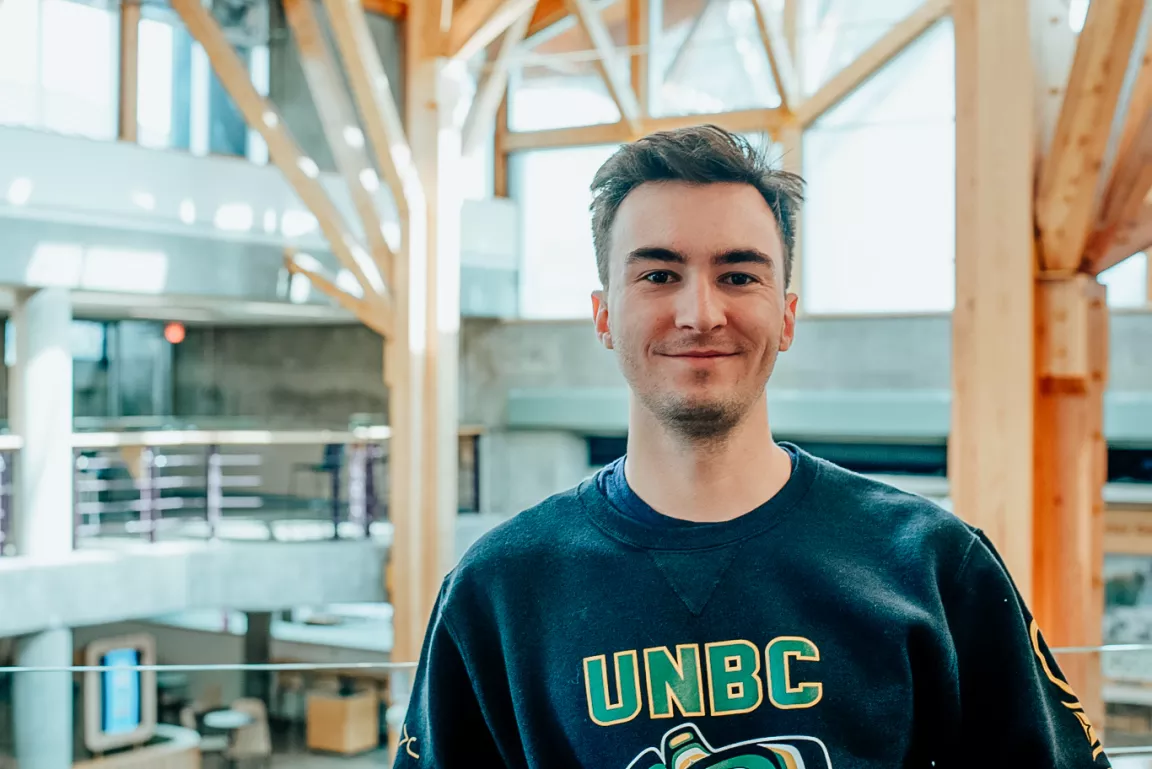Strong foundation for future learning
The breadth and depth of experiences that came with pursing a Bachelor of Arts degree at UNBC ignited a passion in Will Hanlon that he plans to carry forward into law school in September. Hanlon will reflect on drawing strength and resiliency from community in his valedictory address to classmates during Ceremony 2 of UNBC’s 2024 Convocation.

Prince George, B.C. - By fully embracing all aspects of University life as an undergraduate student, Will Hanlon built an exceptional foundation for leveraging his knowledge in the next phase of his post-secondary journey.
On May 31, Hanlon will graduate with a Bachelor of Arts degree with a joint major in Geography and Political Science. Cultivating a passion for issues surrounding climate change, sustainable development and land rights over the course of the past four years, he will continue to foster his desire to lead positive change as he enters Osgoode Hall Law School at York University in Toronto in the fall.
Born and raised in Prince George, Hanlon graduated from College Heights Secondary School in 2020.
“Many of us did not start our University education in ideal conditions with the pandemic hitting four years ago, but we are resilient,” says the Class of 2024 Valedictorian. “It took hard work and I hope everyone can feel pride in that accomplishment.”
For Hanlon, the hard work took the form of fully engaging in his coursework, connecting with his instructors, seeking out research and experiential learning opportunities and actively participating in the University community.
While both his parents are faculty at UNBC — his mom is Dr. Catherine Nolin, the Chair of the Department of Geography, Earth and Environmental Sciences and his dad is Dr. Neil Hanlon, a Geography Professor and Adjunct Faculty Member in the School of Health Sciences and Northern Medical Program — Hanlon says he chose UNBC for its small class sizes and research opportunities for undergraduates.
He says the wide breadth of classes in his joint major uniquely allowed for the examination of similar issues from different angles and perspectives.
“The professors in my degree program are experts in their fields and they are willing to go above and beyond to support students in their learning experiences.”
While in the third year of his degree, Hanlon partnered with Political Science Professor Dr. Gary Wilson through the Undergraduate Research Experience program to research the impact of Brexit (the United Kingdom’s exit from the European Union) on three small islands: the Crown Dependencies of Jersey, Guernsey and the Isle of Man. The collaboration resulted in a co-authored paper published in a peer-reviewed journal Small States and Territories.
To have an academic paper published as an undergraduate is a significant accomplishment, but a highlight from the experience for Hanlon came earlier in the process when he presented with Dr. Wilson during UNBC’s 2023 Research Week.
“I had never presented in that sort of setting before,” says Hanlon. “So, I found it incredibly fulfilling to share our research with this engaged audience — to answer their questions, listen to their responses and take that exchange away with me as we continued our work.
“One thing I hope other students take away from my experience is that you don’t have to be a graduate student to get involved in research,” says Hanlon, who joined UNBC’s Research Ambassadors program this past year to encourage undergraduates to seek out those opportunities.
From working in the Geoffrey R. Weller Library as a student assistant, to serving on the UNBC History Club Executive Committee, to sitting as the undergraduate student representative on the Faculty of Indigenous Studies, Social Sciences and Humanities’ Faculty Council, Hanlon has been an active, informed and dedicated student leader on campus.
“As I head off to law school in the fall, I will take the strong sense of community from UNBC with me and hope to foster similar sentiments wherever I end up,” he says.
Hanlon’s takeaways from his time at UNBC seem to closely mirror the values encapsulated in his contributions to the University community: inclusivity of all ideas and perspectives, the need to think differently to lead positive change, and the importance of collaboration.
“For me, being able to draw on the support of my classmates and our faculty has been the linchpin of my success at UNBC.”